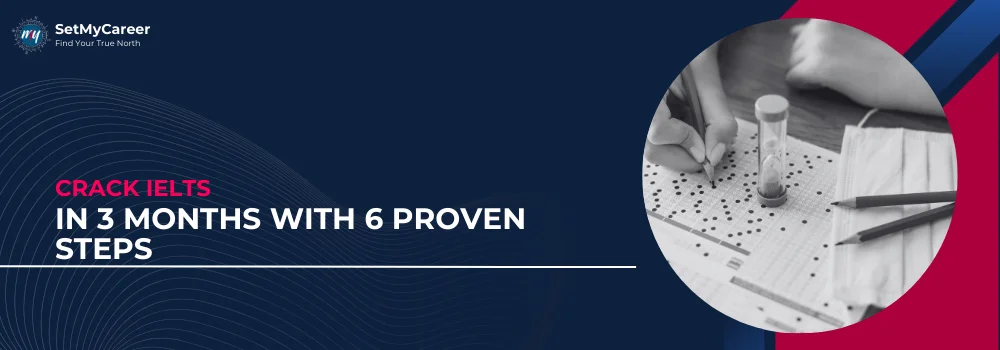
Published by Dr. Nandkishore Rathi on 29 March 2025
Chief Career Navigator
Dr. Nandkishore Rathi is passionate about identifying people's passions and helping them create and lead successful and fulfilling careers. With 30+ years of experience and interactions with thousands of students, academicians, and corporate executives, he has developed a range of career services aimed at benefiting individuals seeking a breakthrough in their professional lives.
Conquer IELTS in 90 days and crack the failsafe code to a high band score, for free.

Dreaming of studying or working abroad? Then you’re probably aware that IELTS (International English Language Testing System) is one of the most recognized English proficiency tests worldwide. While the thought of preparing for it might seem overwhelming, don’t worry! Most processes that have to do with university applications and visa require a candidate to achieve a minimum band score in an English proficiency test. With the right strategy, consistent effort, and smart planning, you can achieve your target band score in just three months.
This guide is designed to make your IELTS journey smoother, breaking it down into actionable steps that will get you test-ready in 90 days. Whether you’re starting from scratch or just looking to fine-tune your soft skills, this plan will help you reach your goal efficiently. Let’s dive in.
The truth? IELTS isn't difficult if you prepare well, but it can be challenging if you go in unprepared. The test is designed to evaluate your English proficiency, not trick you. However, many candidates struggle because they underestimate the importance of familiarity with the test format and time management.
If English is already a part of your daily life—through reading, writing, speaking, and listening—you’ll find IELTS easier than someone who rarely uses English. However, even fluent speakers sometimes score lower than expected due to poor test strategies or nervousness. That’s why structured preparation is key!
Let’s address this age-old debate! While both tests assess your English skills, they differ in format, difficulty, and structure. Here’s a quick breakdown:
has a mix of British, Australian, and global English accents. It includes a face-to-face speaking test, which can be easier for those comfortable with direct communication.
s fully computer-based and mostly uses North American accents. It has multiple-choice questions and requires speaking into a microphone rather than interacting with a person.
Many people consider TOEFL to be harder than IELTS. Why?
Speaking Section: In IELTS, you speak to a real examiner, which allows for a more natural conversation. In TOEFL, you speak into a microphone, which can feel unnatural and challenging, especially under time pressure.
Reading Section: TOEFL reading passages tend to be longer and more academic, requiring strong comprehension skills. IELTS, on the other hand, has a mix of academic and general reading passages, making it more accessible for many test-takers.
Listening Section: TOEFL often has longer audio recordings with more complex academic discussions, while IELTS features shorter, everyday conversations and lectures that are more predictable.
Writing Section: TOEFL requires typing your responses, which can be a challenge for those who type slowly. IELTS allows handwritten essays, which some candidates find easier.
Test Format: TOEFL is completely computer-based, meaning you need to be comfortable with a digital interface. IELTS offers both paper-based and computer-based versions, providing more flexibility.

Master the exam in just 3 months with these 6 foolproof steps
Ace IELTS TodayIt depends on your strengths! If you’re more comfortable with British or Australian English, face-to-face interactions, and handwritten tasks, IELTS might be the better option. If you’re comfortable with computer-based tests, typing, and American English accents, TOEFL could be a good fit. Ultimately, preparing strategically for the type of test that suits your circumstance is key to landing the highest paying jobs abroad.
Before you even think about practice tests, take time to understand the structure of IELTS. There are four sections:
Listening (30 minutes, 40 questions)
Reading (60 minutes, 40 questions)
Writing (60 minutes, 2 tasks)
Speaking (11-14 minutes, 3 parts)
Each section requires a different skill set, so your preparation needs to be tailored accordingly. Don’t just memorize—understand what’s expected in each section, the common question types, and how answers are scored.
Pro Tip: Download past IELTS question papers and spend an hour just analyzing the structure. It will save you tons of time later! To plan your preparation effectively, check the IELTS exam dates for 2025 in advance and set milestones for your progress.
A solid study plan will keep you on track. Here’s how you can structure your 90-day prep:
Month 1: Building the Foundation
Get familiar with the test format.
Identify your strengths and weaknesses.
Start daily reading, listening, writing, and speaking practice.
Build your vocabulary with at least 5-10 new words daily.
Watch English news channels and listen to podcasts for accent familiarity.
Month 2: Strengthening Your Skills
Take timed practice tests for each section.
Work on speed-reading techniques.
Improve your writing structure (especially essay writing!).
Practice mock speaking tests with a friend or tutor.
Month 3: Intensive Practice & Mock Tests
Take full-length IELTS mock tests every week.
Focus on time management and accuracy.
Identify common mistakes and fix them.
Get comfortable with exam conditions (use a timer, sit in a quiet room, etc.).
Pro Tip: Don’t just practice—review your mistakes! Understanding why you got a question wrong will help you avoid repeating the same error.
Let’s break it down section by section:
Listening: Train Your Ears for Different Accents
Listen to podcasts, TED Talks, and BBC News to get familiar with different English accents.
Read the questions before listening to anticipate answers.
Learn to spot keywords and synonyms—they won’t always use the exact words from the question!
Reading: Improve Speed & Comprehension
Practice skimming and scanning to find answers faster.
Underline key points while reading.
Start with easier passages and work up to academic texts.
Writing: Ace Both Tasks
Task 1 (Graphs/Charts/Letters): Focus on clear structure and key data.
Task 2 (Essay Writing): Learn how to present strong arguments with examples.
Avoid repetition—use synonyms and varied sentence structures.
Speaking: Speak Confidently, Not Perfectly
Don't memorize answers! Examiners want to see natural conversation skills.
Expand your responses instead of giving one-word answers.
Practice answering random questions aloud daily.
IELTS isn’t just about knowing English—it’s about performing under pressure. Take at least 5 full-length practice tests before your exam. Simulate real conditions: use a timer, avoid distractions, and take all sections back-to-back.
Pro Tip: Use the Cambridge IELTS series for authentic practice tests.
Don’t waste time! If a question is too hard, move on and come back later.
Read instructions carefully—even small mistakes can cost you marks.
In Writing and Speaking, clarity > complexity. Use simple, clear language.
Success in IELTS comes down to daily practice. Here’s how to keep up the momentum:
Set daily goals (e.g., “Write 1 essay” or “Listen to a TED Talk & summarize it”).
Join IELTS study groups or find a study buddy.
Speak English as much as possible—even if it's just thinking in English!
Cracking IELTS in three months is absolutely possible with smart interview skills, strategies, and consistent effort. Know the test format, follow a structured plan, practice strategically, and most importantly, stay confident!
By following these steps, you’ll walk into your IELTS test fully prepared and ready to excel. Now, go start your career journey—and remember, you’re closer to your dream score than you think! Practicing these tips consistently and effectively will help you realise your study abroad dreams with next to no effort.
No. 14/595, 1st Floor, Nanjappa Reddy Layout, Koramangala 8th Block, Bangalore 560095